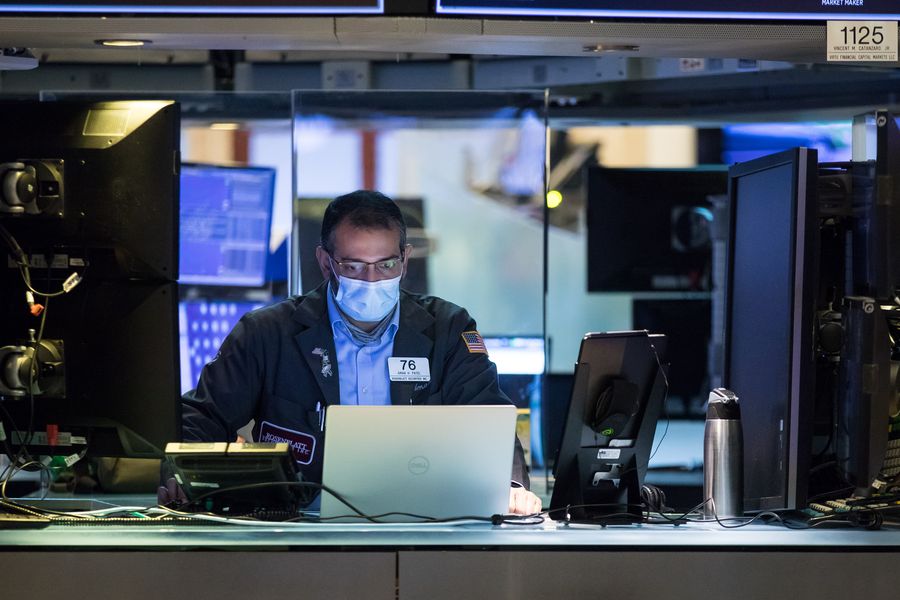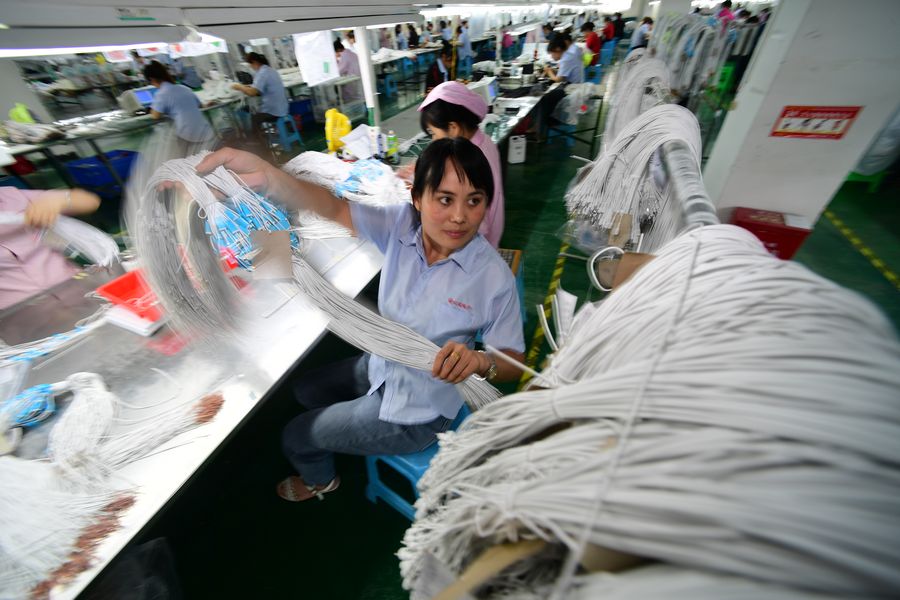Video: Geoffrey Garrett, dean of the Wharton School at the University of Pennsylvania, calls for stronger world leadership as COVID-19 slows globalization, during a recent tele-video interview with Xinhua. (Xinhua)
"If we look at the big logic of the global economy over the last 40 years, I really think it (globalization) has been a win-win," says Geoffrey Garrett.
WASHINGTON, May 27 (Xinhua) -- The COVID-19 pandemic will likely accelerate the trends against globalization as countries seek to be more self-reliant in the wake of the crisis, said Geoffrey Garrett, dean of the Wharton School at the University of Pennsylvania.
Reversing globalization, however, will drive up the prices of consumer products and limit the growth potential for global economies, especially emerging markets, Garrett told Xinhua in a recent video interview, calling for better leadership to keep trade open and allow the world to continue to benefit from globalization.

Aerial photo shows a China-Europe freight train, also the "China Post" CR Express 1st block train, running under a bridge in Chongqing Municipality, southwest China, April 3, 2020. (Xinhua/Tang Yi)
DEGLOBALIZATION "VERY BAD IDEA"
Garrett said the peak of globalization was probably right before the 2008 financial crisis, and subsequently in the Western world, there has been a lot of pushback to it, with concerns over job losses, among others.
"I think that's just going to be accelerated now by the pandemic and the notion that everything needs to be closer. Supply chains need to be shorter. We need to be more self-reliant," he said, noting that this partially resulted from a shortage of medical supplies in some countries.
Some 156 export controls on medical supplies and medicines have been executed by 85 governments since the beginning of the year, according to a recent report by Global Trade Alert, a trade policy monitoring initiative.
The Wharton dean said there exists a political tendency to promote self-reliance, but it's a "very bad idea" for two reasons in his view.
"One is that in the Western world, certainly consumer prices will be higher," he said. "In the United States, imagine if the iPhone were actually assembled in America rather than by Foxconn in China, the price would just be much higher."
"But on the other side, I think it's really true that globalization has been a big growth driver for emerging markets," he said. "I think Africa, for example, really needs more connection with the global economy, not less."
While he understands the anti-globalization sentiment right now, Garrett said "if we look at the big logic of the global economy over the last 40 years, I really think it (globalization) has been a win-win."
"So it'd be a terrible thing in my opinion, if we really reverse that and we reverse it for a long period of time," he said.
In light of the anti-globalization trend, the Wharton dean said "what we need is leadership, leadership that explains to the average citizen how the global economy actually works," so that the public doesn't see trade a zero-sum game.
Aside from efforts from the leadership, Garrett said multinational firms, which have been unwilling to explain how their businesses really work in a way that average citizens can understand, should step up to do so.
Additionally, even if the global economy benefits in aggregate from globalization, some people are dislocated in the short term, Garrett said. "So we've got to think about how to minimize the cost to them."
"I do think we need just better leadership on the global stage to ensure that we continue to get the benefits of globalization while somehow cushioning the adverse impact of globalization on some people, the kind of frictions that it creates," he said.

A trader wearing a face mask works on the trading floor of the New York Stock Exchange in New York, the United States, on May 26, 2020. The New York Stock Exchange (NYSE) partially reopened its iconic trading floor on Tuesday after a two-month closure due to the COVID-19 pandemic. (Colin Ziemer/NYSE/Handout via Xinhua)
GLOBAL RECOVERY COULD TAKE LONG
As countries slowly start to loosen containment measures, Garrett said he expects the global economy to take a longer time to recover.
"Part of that will be logistical. It's just really hard, for example, to rebuild global supply chains or open them up," Garrett said, noting that reopening the economy will be a gradual process.
"But I think the bigger element is psychological. People are going to have to be confident enough to go back to live the daily lives. And I think that's just going to take some time," he said.
When asked about the major challenges for global economic recovery, the Wharton dean said "the fact that demand has collapsed in this economic hibernation is just a profound thing." However, that demand could come back, he added.
Another key challenge, Garrett believes, is that good businesses could go bankrupt because they don't have any revenue right now, and government bailouts are not unlimited. "I think that would slow the recovery," he said.
Despite the overall gloomy picture, Garrett has seen a silver lining. "The two obvious things to say, that technology and healthcare companies will do well coming out of the crisis," he said, noting that NASDAQ, a U.S. stock index powered by big tech companies, is actually up for the year.
Beyond that, Garrett highlighted the potential for the finance sector, saying that the world of private equity, hedge funds and venture capital will "probably boom" during the pandemic as they did after the global financial crisis.
Looking back to the period after the 2008 financial crisis, Garrett said major governments, including China, the United States and Britain, had taken enormous actions in response to the crisis, and also had lots of collaboration and coordination mostly through the Group of 20.
"I think that kind of international collaboration has just been absent so far in response to the pandemic. And I hope we can change that," said the Wharton dean, noting that each country's fiscal and monetary stimulus, though strong and appropriate, has a national and inward-looking focus.
"It's understandable for governments to want to use national policy tools to affect the national economy. But if they can do that in a way that promotes international coordination and international openness, that's a better way to go," he said.

Employees work in an earphone factory at an economic development zone in Suiyang, southwest China's Guizhou, May 18, 2020. The economic development zone in Suiyang has resumed work and production. By mid-May, its production value has reached 990 million yuan (139.2 million U.S. dollars). (Xinhua/Yang Ying)
CHINESE ECONOMIC ACTIVITY PICKING UP
Commenting on China's recovery from COVID-19, the Wharton dean said "obviously China is several months ahead of the West, and it looks like Chinese domestic economic activity has picked up dramatically in the last month or so."
Garrett believed the problem for China now will be global demand, and
noted that 2020 is just going to be "an incredibly difficult year" for every economy in the world, including China.
However, he said "we should just never lose sight of the fact that what's happened in China since 1978 is probably the greatest economic miracle in the history of the world."
"Lifting 700 million people out of poverty in three or four decades is just extraordinary," he said, referring to China's poverty alleviation efforts.
On China-U.S. relations, Garrett the U.S. government obviously has taken a very hard stand on technology in the last 12 months, with export restrictions on Huawei being an example.
By imposing export control restrictions on the Chinese tech giant, "we're also hurting American firms like Broadcom and Qualcomm and Flextronics that have such strong and long lasting relationships with Huawei," he said.
Garrett noted the world has benefited from companies like Apple, Google, Huawei being global firms, not national firms. "I hope we don't lose sight of that bigger picture," he said. ■



